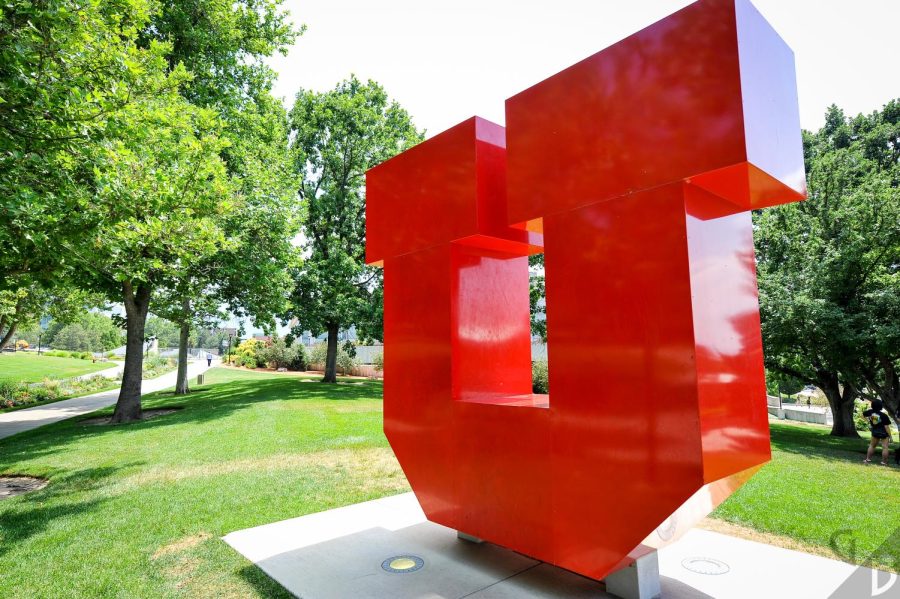U Reckons With Recent National Rise in Antisemitism
The Block U on the University of Utah Campus in Salt Lake City, Utah on July 12, 2017. (Photo by Adam Fondren | Daily Utah Chronicle)
November 18, 2022
In recent weeks, comments made by public figures such as Ye, the artist formerly known as Kanye West, Kyrie Irving and Dave Chappelle have brought attention to the issue of antisemitism in the U.S. This issue is not new. The Anti-Defamation League reported in April that antisemitic incidents reached an all-time high in the U.S. in 2021.
There have also been several antisemitic incidents reported on the University of Utah’s campus in the last several months, with a pair of incidents being reported in September as well as a swastika spray-painted on a construction sign in the Health Sciences campus in June.
“We’re definitely seeing this major uptick in antisemitism [nationally], and there are a few reasons that we think we’re seeing that,” said Asher Ireland, second-year geography major and the Israel chair at Hillel for Utah, the largest student group on campus for Jewish students. “One is we’re seeing antisemitism from both ends of the political spectrum from the far right and the far left.” He mentioned the march on Charlottesville in 2017 where protestors recited antisemitic chants, as well as criticisms of Israel from people on the far left that he feels go beyond legitimate criticism into being antisemitic.
Brian Nicholls, special assistant to the chief safety officer at the U, said that the rise in antisemitism is symptomatic of a larger issue in the country, where all marginalized groups are being increasingly targeted by bias and hate incidents.
“It doesn’t matter which group it is, it seems like everybody’s being targeted more,” he said. “Whether it’s Muslim students or Jewish students or immigrants, I mean, it just seems like marginalized or historically underrepresented folks are just kind of constantly under fire lately.”
Nicholls said that the protocol for handling antisemitic incidents is a bit more complicated than other bias incidents because the university is prohibited from asking students about their religious beliefs, and therefore doesn’t have a list of all Jewish students at the U.
“So we have to sort of rely on folks who have self-identified to affinity groups or student groups within the university to communicate out to those groups and then distribute that communication out through the EDI (Equity, Diversity and Inclusion) centers and to the student affairs directors,” he said.
Ireland said Hillel for Utah, a division of Hillel International, is one of two major Jewish organizations found on college campuses around the country, and is focused on providing a place for Jewish students to call home regardless of political or religious beliefs. “You’re a Jewish student, you need a home, you need a meal on a Friday night, that’s what Hillel is for,” he said.
Ireland also works with the United Jewish Federation of Utah on their Antisemitism Task Force where he works with other groups around Utah to combat hate. These groups include members of the African American and LGBT communities as well as local government leaders.
“We work together to try and address these overall issues of hate and violent extremism as a united front as opposed to a piecemeal effort that you see,” Ireland said. He added that in this approach, minority groups work together to respond to hate incidents rather than each individual community only responding to the incident that affects them.
“The reason this is so important is we need to recognize that minority communities have small voices compared to majority communities, but in the United States today, we are quickly approaching majority-minority status, which means to say that there isn’t one monolithic group that controls over 50%,” Ireland said. “We have so much of a melting pot, and when we have hate, if all of these groups can come together and say, ‘this is a problem, this attack was a problem; we all stand united,’ we just increase the chorus of voices and it brings more attention, publicity and we add more voices for change.”
He added that the issues that affect different communities vary, and when an individual community is affected by something, it’s important to listen to that community and follow the response that they recommend.
In addition, Ireland works with the U’s Campus Climate Initiative, which is through Hillel International.
“The University of Utah and Hillel International as well as Hillel for Utah worked very closely together to manage Jewish issues, antisemitism on campus,” Ireland said of the CCI. “We’re part of a cohort of universities, so that the university is very aware of what is happening with our community, addressing it, making sure that our community and the general population who is interested in this knows what problems are happening, and we can work with the EDI office to try and come up with solutions for the university.”
According to Hillel International’s website, CCI “works collaboratively with higher education administrators to ensure a positive campus climate in which Jewish students feel comfortable expressing their identity and values, free of antisemitism, harassment or marginalization.” It places emphasis on administrative leaders in universities taking on roles to affect education and policy in order to benefit both Jewish students and the larger campus community.
A 2021 CCI survey found that nearly one-third of Jewish students experienced antisemitism on U.S. college campuses in the 2020-21 school year. Nicholls, who also works with CCI, said the survey conducted at the U that contributed to the national data inspired identifying possible changes to make, including updating the university’s calendars to include important religious dates for Jewish students as well as creating an interfaith resource center on campus in order to better serve students of diverse faiths. Both of these changes, Nicholls said, would benefit students of many faiths, not just Jewish students.
Aside from these large-scale organizational efforts to combat antisemitism, Nicholls encouraged students to speak up and intervene if they witness antisemitism on campus. He also suggested students go through the Center for Student Wellness’ bystander intervention training.
“If you can take some of those available educational courses on bystander intervention and add that to your toolkit, and you feel comfortable, if you see someone experiencing something where they look uncomfortable,” he said. “If you have bystander intervention as part of your toolkit, then you can speak up and say something for the person in that situation who by themselves might not feel comfortable standing up for themselves.”
Ireland echoed that sentiment, adding it’s important to report those incidents to the university as well. He also placed emphasis on Jewish students who experience antisemitism reaching out to Jewish leaders around campus.
“If you’re a Jewish student and you’re experiencing this, reach out to Hillel, reach out to your community, to your rabbi, to the [United] Jewish Federation of Utah, and we can help you make sure that everything gets filed in the right place, make sure that you feel safe, helping you get to a safe location,” he said.
Ireland also spoke to the personal benefit that getting involved with the Jewish community on campus has had for him in general, and in dealing with antisemitism.
“It’s the idea of a place where you don’t need to explain yourself, where everyone knows where we all come from,” he said. “You don’t need to say, ‘Oh, I had a hard day, I had to explain all of my identity, I had to tell people I don’t have horns.’” He added having a Jewish community to go to where everyone has similar backgrounds makes him feel more comfortable on campus.
“It’s a group of people that you don’t need to prove why you should be a part of that community,” he said. “You’re a part of that community, and they will embrace you whenever, no matter what, and they will be there, no matter what challenges you’re facing.”








